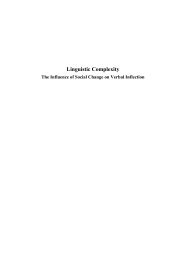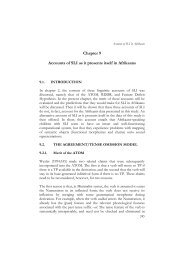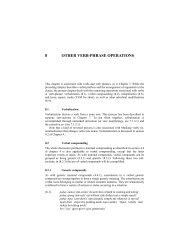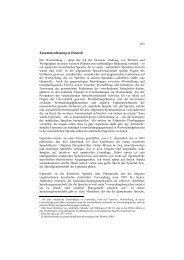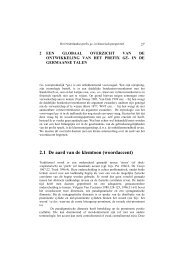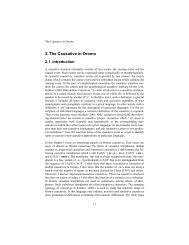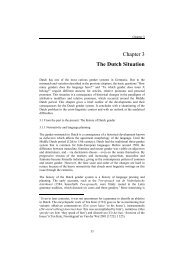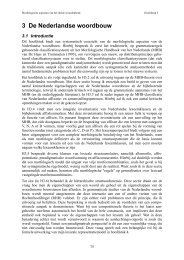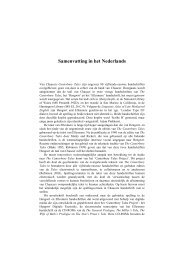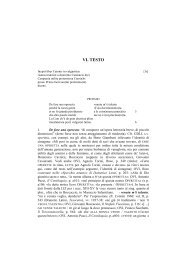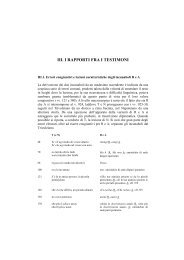chapter 2 stance adverbs qualifying a standpoint - LOT publications
chapter 2 stance adverbs qualifying a standpoint - LOT publications
chapter 2 stance adverbs qualifying a standpoint - LOT publications
You also want an ePaper? Increase the reach of your titles
YUMPU automatically turns print PDFs into web optimized ePapers that Google loves.
64<br />
CHAPTER 2<br />
propositions at the same time, one asserting the embedded proposition and<br />
another asserting a proposition that contains the adjective from which the<br />
evaluative adverb derives:<br />
Unfortunately, Clark Kent is Superman<br />
a. Clark Kent is Superman<br />
b. That Clark Kent is Superman is unfortunate<br />
Evaluatives unlike the so-called illocutionary <strong>adverbs</strong> do not add a comment to<br />
the speech act that is performed by means of asserting the proposition in the<br />
sentence but rather add a comment to the event or state of affairs that is<br />
described in the utterance. Nevertheless, the comment that evaluatives add to<br />
the content of the utterance does not contribute directly to the truthconditional<br />
status of the utterance, unlike the case with modal <strong>adverbs</strong> (see<br />
2.3.1.2 above). A number of accounts have been proposed in order to explore<br />
how evaluative <strong>adverbs</strong> contribute to the meaning of the utterance.<br />
Bach (1999) agrees with Bellert (1977) that utterances containing an<br />
evaluative adverb express two propositions, “the proposition expressed by the<br />
matrix sentence and the proposition that the fact stated by that proposition has<br />
the property expressed by the assessive [=evaluative]” (p. 359). He contrasts<br />
utterances containing such <strong>adverbs</strong> with those containing modal <strong>adverbs</strong> like<br />
certainly saying that the latter express only one proposition. Somehow<br />
confusingly, though, he includes in his list of <strong>adverbs</strong>, which he labels<br />
„assessives‟, and which he considers to be content-modifiers not utterancemodifiers,<br />
<strong>adverbs</strong> like obviously, of course, and undoubtedly next to <strong>adverbs</strong> like<br />
amazingly, coincidentally, disappointingly, (un)expectedly, (un)fortunately, incredibly,<br />
inevitably, ironically, luckily, naturally, oddly, predictably, regrettably, sadly, surprisingly. He<br />
maintains that these <strong>adverbs</strong> can occur within the subordinate that-clause of an<br />
indirect quotation and thereby contribute to the specification of what is said,<br />
unlike utterance-modifiers, which cannot. 45<br />
Jayez and Rossari (2004) remark that evaluative <strong>adverbs</strong> are puzzling as far<br />
as their contribution to the meaning of an utterance is concerned, because they<br />
seem to “interact with the assertive force of the sentence in which they occur”,<br />
while at the same time they are not part of what is said. They conclude that<br />
evaluative <strong>adverbs</strong> trigger conventional implicatures since they are not part of<br />
what is said and they fail the tests that detect presuppositions. The authors<br />
suggest that the same status of conventional implicatures is shared by other<br />
parentheticals as well, namely connectives and the so-called illocutionary<br />
<strong>adverbs</strong> (see also Bonami et al., 2004).<br />
Ifantidou (2001), who works within the framework of Relevance Theory,<br />
observes that evaluatives contribute to the level of higher-explicatures in the<br />
45 Bach‟s list of „utterance modifiers‟ includes <strong>adverbs</strong> like confidentially, metaphorically, and truthfully,<br />
which I discuss in the next section under „illocutionary <strong>adverbs</strong>‟. Interestingly, the prototypical<br />
illocutionary adverb frankly is missing from his list.



